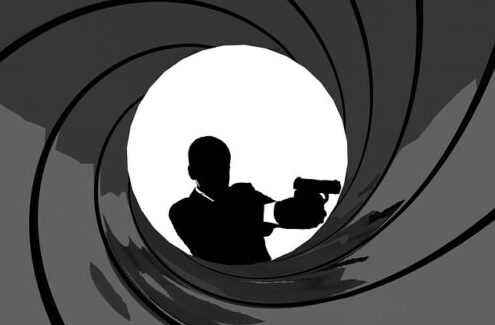There’s a reason why thriller novels are so captivating: the suspenseful action and the quick, punchy dialogue. But one of the elements that make a thriller stand out is the use of strong verbs.
Weak verbs can make your writing seem flat and uninteresting, while strong verbs convey excitement and tension.
In this blog post, we’ll discuss what strong verbs are and how to use those words in your writing. We’ll also look at some examples from well-known thrillers to see how they’ve used these verbs to create an immersive reading experience.
What makes a verb strong in a thriller novel?
A strong verb conveys action. It’s a word that describes what’s happening, not just what happened or will happen.
Strong verbs are usually active rather than passive: they show who or what did something, instead of describing the object being acted upon by another actor (or thing).
For example, an active verb would be “The detective grabbed the suspect,” while a passive verb would be “The suspect was grabbed by the detective.”
Active verbs are more immediate and exciting, which is why they work so well in thrillers. They create tension and keep the reader engaged, making it difficult to put down the book.
How to use strong verbs to create suspense and tension?
You can create suspense and tension in your story by using strong verbs to describe what’s happening at every moment.
The more vivid your language, the more likely it is that you’ll draw readers into the scene with you – and if they’re caught up in those tense moments too – they’ll keep turning pages!
Here is an example of strong verbs in a sentence:
– The detective sprinted to the scene, gun drawn.
This sentence immediately creates a sense of urgency and suspense. The reader can see the detective running, hear his feet pounding on the ground, and feel the excitement in the air. All through a few well-chosen interesting verbs!
When you’re looking for the correct verb to convey the excitement in your story, it’s crucial to pick one that engages all of the reader’s senses. Use words that make them feel like they are right there in action.
Evoke anticipation with phrases like

– He stalks into the room, his eyes cold and calculating.
– The journey has just begun.
– Tick-tock, the clock is ticking.
Set the scene with sensory detail like
– The curtains are blowing in the wind, and the moon casts a pale light over everything.
– As she entered the room, the sweet smell of vanilla and lavender greeted her. She took a deep breath, feeling the coolness of the air conditioning against her skin. The soft light from the lamps created a warm glow in the room. She saw him lying there, his chest slowly rising and falling with each breath. Tears welled as she walked over to sit on the edge of the bed and took his hand. Gently stroking his hair back from his forehead, she whispered, “I love you,” and leaned down to kiss him goodbye.
Create suspense with cliffhangers and plot twists
– She turns the corner and sees him standing there, covered in blood.
– Suddenly, a bright light shines in her eyes, temporarily blinding her. She tries to shield her eyes from the light and run away, but she’s rooted to the spot. The person holding the light walks closer until she can see their face. It’s her best friend from childhood. Eased by the sight of a familiar face in such a dangerous situation, she relaxes for just a second before her best friend pulls out a knife.
Bring your scenes to life
– He races across the room, dodging bullets as he goes.
– He slipped into the loud, overheated bar, picked a table in the corner, and ordered a pint of Stella. He scanned the place, squinting over the rim of his glass. He couldn’t see Mike anywhere. He stared at the floor, hair falling over his face. Only his eyes lifted whenever someone entered. Time was running out.
He heard a scuffle and looked up. Two men were pushing through the crowd; their eyes fixed on him. He bolted for the exit, knocking the table and his glass flying, and burst through the door. He raced into an alley and dove under a loading dock, slicing his jaw open on a step. His eyes squeezed shut and his mouth opened in a silent scream that made his body shake.
Engage your readers’ emotions

Tap into their imagination, such as “The door creaks open and the sound of footsteps echo through the hallway.”
When you generate a list of strong verbs for your thrillers, it’s essential to understand what makes a thriller exciting. A thriller is characterized by its fast-paced, action-packed plot that keeps the reader on the edge of their seat.
Here is a list of strong verbs you can use in your thriller
– strong action verbs like jump, leap, swing, dash, race, spin, fly
– evocative verbs like thrill, terrify, excite, stimulate, energize, captivate, engage
– transitive verbs like to hunt, to stalk, to pursue, to track, to search, to explore, to discover
– adverbs powerful verbs to make a strong verb extra powerful, like “John grudgingly shared his chicken nuggets.”
When you read or hear about something that thrills you, your body reacts by releasing adrenaline, which causes the “thrill” feeling.
Similarly, when you read or hear about something that terrifies you, your body reacts by releasing cortisol and other stress hormones, which is what causes the “terror” feeling.
And when you read or hear about something that excites you, your body reacts by releasing dopamine and other pleasure hormones, which is why it feels exciting.
So these types of verbs do create a specific sense in the reader by stimulating the nervous system. And this can be exciting for the reader.
But be careful. It can also confuse the reader if you use too many of these verbs in your writing. Why? Because when you describe something as thrilling, terrifying, exciting, and so on too often, then it starts to lose its meaning. It becomes boring and repetitive – and that’s not what we want readers to feel.
Examples of powerful verbs from well-known thrillers
The Godfather – He shot the man in the chest.
Gone Girl – She slashed his throat.
The Hurt Locker – He blew up the house.
To Kill a Mockingbird – He shot him between the eyes.
The Girl with the Dragon Tattoo – She sliced his jugular.
The Silence of the Lambs – He reached up, dug his fingers into her eye sockets, and ripped her eyeballs out.
The importance of using the correct verb at the right time
When choosing a verb for your story, it’s essential to consider the tone of your story and the effect you want to achieve. Different verbs can create different results, so choosing the right verbs is vital.
Here are a few tips on how to choose the correct verb:
– Consider the tone of your story. Is it light and playful, or dark and severe? Different verbs can create different tones, so choose the one that matches your story.
If your story is light and humorous, use verbs that reflect that tone (e.g., laughed, joked). If your story is dark or severe, use verbs that reflect that tone (e.g., whispered, glared).
– Consider the effect you want to achieve. For example, do you want your story to be tense and exciting or calming and relaxing? Different verbs can create other effects, so choose the one that best suits your needs.
Why verbs are so crucial in building suspense and tension in your thriller novel
Verbs are essential to building tension in a thriller because they create movement and action. Without verbs, your writing would be static and lifeless. Using strong verbs to describe the action lets you develop a sense of suspense and urgency that will keep your readers glued to the pages.
For example, compare these two sentences:
Tom walked into the room.
Tom crept into the room.
“Walked” is a weak verb and makes the first sentence dull and lacking tension. However, the second sentence creates a sense of suspense by using a stronger verb that implies Tom is doing something sneaky or secretive.
Tips for choosing the correct verb for your story

There isn’t necessarily one correct verb to select for your story. It depends on the story itself and how you want it to show. However, here are a few things to keep in mind when choosing a verb:
– Verbs should always agree with their subjects; for example, if the subject is plural, the verb should also be plural.
– Verbs should match the tense of the sentence; for example, if the sentence is in the past tense, then the verb should also be in the past tense.
– Choose verbs that accurately convey the action or state of being that you want to describe; for example, don’t use “ran” if you mean “jogged.”
When writing a thriller, it’s essential to use the correct verb because it will help create the desired effect and keep your readers engaged.
Choose active verbs that evoke strong emotions.
Use verbs that create a clear picture.
Use verbs that convey action and movement.
Use verbs that are specific and concrete. Specific, concrete verbs can help you to be precise and vivid when writing. They can also add power and immediacy to your words. Some specific, concrete verbs are:
break, build, carry, chase, climb, color, cook, create, cut, draw, drop, fight, fill, fling, flutter, fly, fry, give, grab
Active verbs create a sense of immediacy and help to keep the reader engaged. They also evoke strong emotions, which is essential for building suspense in your story.
Here are a few examples:
– He clenched his fists and stomped out of the room.
– He raced into the room.
– She crept up the stairs.
– The dog bounded across the yard.
Resources to help you learn more about powerful verbs for thrillers:
There are many great resources for learning about powerful verbs for thrillers. Here are a few of our favorites:
– The 10 Best Strong Verbs for Thrillers – This article from Writer’s Digest offers a great list of powerhouse verbs that can add intensity to your writing.
– The Action Writer’s Handbook by Lee Child.
– Another great resource is The Verbs Handbook by Bruce B. Templeton. This book provides an in-depth look at the various ways you can use verbs to create suspense and tension in a story. It includes descriptions of over 1,000 action verbs and examples of how you can use them to achieve different effects.
Conclusion
In a thriller novel, strong verbs are necessary to create suspense and tension. On the other hand, the wrong verb can lessen the effect of your story by taking away from the desired atmosphere you want readers to feel when they read your words.
If you’re writing a thriller novel or any other type of fiction, make sure you understand how essential verbs are in building suspense and tension. And which ones work best depending on what tone or emphasis you need them to convey at specific points in your book.
You can use many power verbs in writing, and they all have their place depending on what you want to convey. Try experimenting with different words to see what works best for your story. And remember that when it comes time for editing, pay attention to the words you choose and how often those words show up.
You’ll find that your story becomes more alive by using stronger verbs, so go for it!
If you’re working on your first novel and are looking for more help with your writing, please check out my other articles at https://ullahakanson.com/blog/
Happy writing,
Ulla

